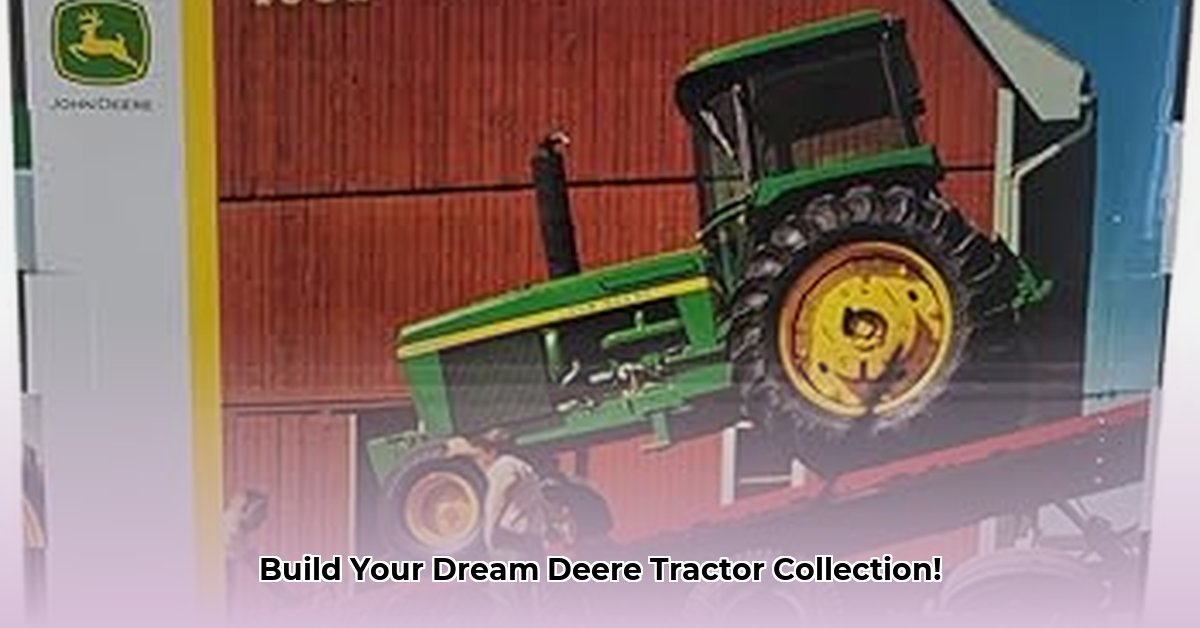
Building a collection of John Deere tractor model kits is more than just a hobby; it's a journey into agricultural history, investment potential, and the thrill of the hunt. This comprehensive guide will equip you with the knowledge to navigate this exciting world, from identifying valuable models to preserving your collection for years to come. For additional resources, check out this helpful website.
A Buyer's Guide: Identifying Desirable John Deere Models
Entering the world of John Deere tractor model kits requires understanding key factors affecting desirability and value. First, consider the scale. Popular scales include 1:16 (larger, more detailed), 1:32, and 1:64 (smaller, simpler). Larger scales often command higher prices due to increased detail and craftsmanship. Beyond scale, features significantly impact value. Detailed interiors, working parts (if any), and accurate paint schemes all add to a model's appeal. "Chase variants" – rare, limited-edition models with unique paint jobs or markings – are highly sought after by collectors and can command significantly higher prices.
The condition of a kit is paramount. A pristine, unopened kit in its original packaging is the most valuable. Minor wear and tear will lower value, while significant damage can drastically reduce its worth, unless it's an exceptionally rare model. Finally, authenticity is crucial; counterfeit models are a major concern. Always buy from reputable sources to ensure authenticity. Online resources and experienced collectors can guide your identification efforts. Don't be afraid to ask questions and learn from seasoned enthusiasts.
Investing in John Deere Tractor Kits: Market Trends and Strategies
The market for John Deere model kits is dynamic, offering both rewards and risks. While demand is generally strong, particularly for rare models, market fluctuations occur. Investing requires understanding these trends. Tracking recent auction data provides a reliable indicator of market value. Cross-referencing this with online marketplaces offers a broader perspective, but be cautious of inflated asking prices. Diversification minimizes risk. Building a collection spanning different scales, model years, and variants offers greater resilience to market shifts than focusing solely on one specific model.
A critical risk to be aware of is counterfeit models. Only purchase from trusted sources with established reputations. Reputable online marketplaces and collector shows offer a level of security that less established platforms may not. Finally, remember that damage and wear can significantly impact a model's value. Proper storage and handling are essential for protecting your investment. Could poor storage habits inadvertently diminish the value of your prized collection?
Caring for Your Collection: Preservation and Maintenance
Preserving your John Deere model kits requires diligent care. Proper storage is vital; keep your models in a cool, dry place away from direct sunlight, humidity, and dust. Display cases or protective sleeves provide extra protection. Handle models gently, washing your hands beforehand to avoid transferring oils or fingerprints. Cleaning should be done carefully using a soft brush and a slightly damp, lint-free cloth. Avoid harsh chemicals or abrasive cleaners that may damage the paint or plastic. A proactive approach to maintenance safeguards both the condition and value of your collection.
The John Deere Legacy: A Piece of Agricultural History
John Deere tractors hold a significant place in agricultural history and American industrial innovation. Collecting their model kits offers a connection to this rich legacy. These aren't merely toys; they're miniature representations of machines that have revolutionized farming and food production for generations. This historical context enhances the appeal and value of your collection, appealing to enthusiasts interested in both the collectible aspect and the historical importance of the John Deere brand. Understanding this legacy adds depth to your collecting experience.
Where to Buy and Sell John Deere Tractor Model Kits: Reputable Sources
Successfully buying and selling John Deere tractor model kits hinges on choosing reputable sources. Online marketplaces can be valuable, but always verify the seller's reputation and check for authentic reviews. Collector forums and dedicated online communities offer a secure platform to connect with experienced collectors, learn about specific models, and discover rare finds. Specialist model shops also provide a good source for both purchasing and selling. Building relationships within the collecting community is beneficial and can lead to access to exclusive sales and information about hard-to-find items. Always be vigilant against counterfeit models and only deal with reputable sellers.
Value Assessment: Key Factors Affecting Price
Several factors influence the value of John Deere tractor model kits:
- Scale: Larger scales (1:16) generally command higher prices.
- Rarity/Limited Editions: Rare colors, limited-edition releases, and chase variants increase value significantly.
- Condition: Mint condition, in the original packaging, fetches the highest prices.
- Authenticity: Genuine models are essential for long-term value.
- Accessories: Original boxes, manuals, and certificates add value.
Building a valuable collection takes time, research, and a passion for the hobby. By following these guidelines, you can develop a thriving collection that combines enjoyment, historical appreciation, and potential investment value.